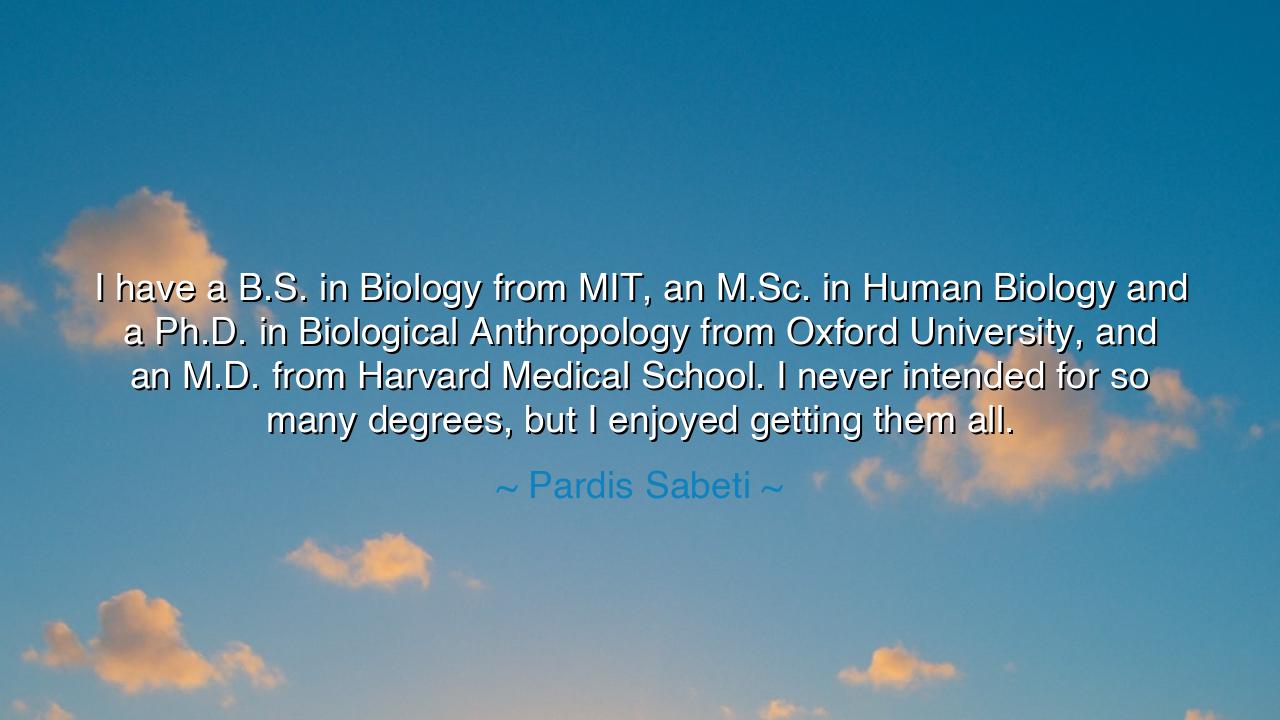
I have a B.S. in Biology from MIT, an M.Sc. in Human Biology and
I have a B.S. in Biology from MIT, an M.Sc. in Human Biology and a Ph.D. in Biological Anthropology from Oxford University, and an M.D. from Harvard Medical School. I never intended for so many degrees, but I enjoyed getting them all.






In the words of Pardis Sabeti, "I have a B.S. in Biology from MIT, an M.Sc. in Human Biology and a Ph.D. in Biological Anthropology from Oxford University, and an M.D. from Harvard Medical School. I never intended for so many degrees, but I enjoyed getting them all." These words reflect the profound journey of a mind unburdened by the constraints of career or expectations, but driven by a genuine passion for knowledge. Sabeti's path is a testament to the pursuit of wisdom not as a means to an end, but as a joyful exploration of the world through the lens of biology, anthropology, and medicine. Her statement reminds us that the process of learning itself can be a fulfilling journey, independent of titles, recognition, or material rewards.
The ancients revered the acquisition of knowledge as a sacred pursuit. In Greek philosophy, Socrates famously declared, "The unexamined life is not worth living." For Socrates, true wisdom was not about accumulating degrees or titles, but about a continuous, unwavering search for truth through self-reflection, dialogue, and the exploration of the world around us. Sabeti’s words echo this Socratic view—that the joy of learning, and the growth it brings, should never be confined to external rewards. She sought knowledge for its own sake, an idea that Socrates would have championed in his pursuit of the truth.
Consider the example of Aristotle, another great thinker from the ancient world, who dedicated his life to the study of everything from biology to ethics. Aristotle believed that the pursuit of knowledge was the highest form of human fulfillment, not for the sake of personal gain, but because it allowed the mind to flourish. Aristotle did not limit himself to one narrow field of study, but approached the world through many disciplines, understanding that true wisdom requires multifaceted knowledge. Sabeti’s own academic journey mirrors this multidisciplinary approach, as she embraced the interconnectedness of biology, anthropology, and medicine to gain a richer understanding of the human experience.
In the same way, Leonardo da Vinci, the great Renaissance polymath, exemplified the joy and passion that come from pursuing knowledge across diverse fields. Da Vinci’s life was defined by his curiosity—his work spanned art, science, engineering, and anatomy, driven not by the desire for recognition, but by a natural curiosity about the world. Sabeti, much like da Vinci, pursued her degrees because she enjoyed the challenge and the discovery, embodying the ancient spirit of a true scholar who is motivated by the intrinsic value of learning.
The lesson that Sabeti teaches us is not just about accumulating degrees or accomplishments, but about the joy that can be found in knowledge itself. In our modern world, where achievement is often measured by titles or success, Sabeti reminds us that the pursuit of wisdom is not solely about ends, but about the process and the satisfaction that comes from learning, growing, and evolving. Socrates’s insistence on the examined life, Aristotle’s broad intellectual pursuits, and da Vinci’s multifaceted genius all point to the same truth: the journey of learning is its own reward, and it is in that journey that true fulfillment lies.
In our own lives, we must seek to embrace learning not as a means to an end, but as a joyful process. Whether we pursue formal education, personal growth, or a deeper understanding of the world, we must approach learning with an open mind, free from the pressures of external validation. Like Sabeti, we must find joy in the pursuit of knowledge, regardless of how many degrees or titles we accumulate along the way. The ultimate lesson here is that learning is not about the recognition we receive, but about the growth, discovery, and wisdom we gain from the process itself.
Let us apply this lesson to our own lives: seek knowledge for the love of learning, and pursue education not as a means to a career or societal approval, but as a sacred journey that nourishes the soul. Whether in the sciences, arts, or humanities, let us approach our intellectual pursuits with the same passion and curiosity that Sabeti and the ancients exemplified. In doing so, we can live a life of continual growth and fulfillment, always seeking to understand more about the world and ourselves. Learning, after all, is not just an academic endeavor, but a lifelong adventure of discovery and joy.






AAdministratorAdministrator
Welcome, honored guests. Please leave a comment, we will respond soon